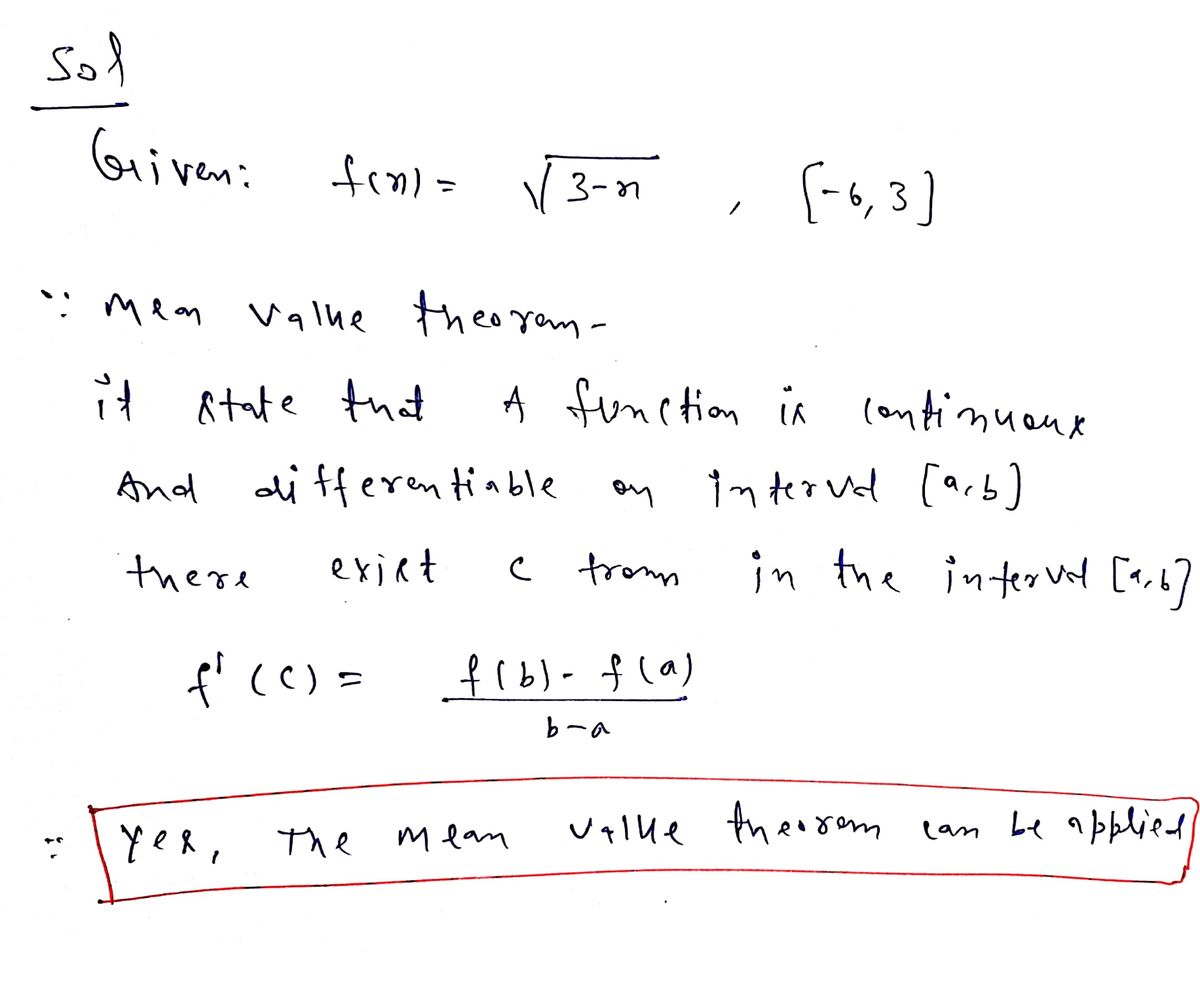Determine whether the Mean Value theorem can be applied to f on the closed interval [a, b]. (Select all that apply.) f(x)=√3-x, 1-6, 3] Yes, the Mean Value Theorem can be applied. No, because f is not continuous on the closed interval [a, b]. No, because f is not differentiable in the open interval (a, b). None of the above. b-a If the Mean Value Theorem can be applied, find all values of c in the open interval (a, b) such that f(c) = f(b)-f(a). (Enter your answers as a comma-separated list. If the Mean Value Theorem cannot be applied, enter NA.) CH
Determine whether the Mean Value theorem can be applied to f on the closed interval [a, b]. (Select all that apply.) f(x)=√3-x, 1-6, 3] Yes, the Mean Value Theorem can be applied. No, because f is not continuous on the closed interval [a, b]. No, because f is not differentiable in the open interval (a, b). None of the above. b-a If the Mean Value Theorem can be applied, find all values of c in the open interval (a, b) such that f(c) = f(b)-f(a). (Enter your answers as a comma-separated list. If the Mean Value Theorem cannot be applied, enter NA.) CH
Calculus: Early Transcendentals
8th Edition
ISBN:9781285741550
Author:James Stewart
Publisher:James Stewart
Chapter1: Functions And Models
Section: Chapter Questions
Problem 1RCC: (a) What is a function? What are its domain and range? (b) What is the graph of a function? (c) How...
Related questions
Question
![[-/1 Points] DETAILS LARHSCALC1 3.2.044.
Determine whether the Mean Value theorem can be applied to f on the closed interval [a, b]. (Select all that apply.)
f(x)=√√√3-x, (-6, 3]
#
Yes, the Mean Value Theorem can be applied.
No, because f is not continuous on the closed interval [a, b].
No, because fis not differentiable in the open interval (a, b).
None of the above.
C =
Type here to search
If the Mean Value Theorem can be applied, find all values of c in the open interval (a, b) such that f'(c) = f(b)-f(a). (Enter your answers as a comma-separated list. If
b-a
the Mean Value Theorem cannot be applied, enter NA.)
A
ar
Z
2
S
#
3
X
E
$
C
12
R
E1
F
6238
5
T
M
G
6
B
Y
D/D
&
7
H
U
N
JA
*
MY NOTES
8
AK
C
M
(10
9
K
ASK YOUR TEACHER
O
O
L
75°F
172
P
G
PRACTICE ANOTHER
paute
200
7:55 PM
10/2/2022
E
10
Se](/v2/_next/image?url=https%3A%2F%2Fcontent.bartleby.com%2Fqna-images%2Fquestion%2Fa89fcfbc-9661-4037-a401-8de41697cbc3%2F5bb855c0-c3f3-4a53-98c1-35a72b5fc5c7%2Fgxy475_processed.jpeg&w=3840&q=75)
Transcribed Image Text:[-/1 Points] DETAILS LARHSCALC1 3.2.044.
Determine whether the Mean Value theorem can be applied to f on the closed interval [a, b]. (Select all that apply.)
f(x)=√√√3-x, (-6, 3]
#
Yes, the Mean Value Theorem can be applied.
No, because f is not continuous on the closed interval [a, b].
No, because fis not differentiable in the open interval (a, b).
None of the above.
C =
Type here to search
If the Mean Value Theorem can be applied, find all values of c in the open interval (a, b) such that f'(c) = f(b)-f(a). (Enter your answers as a comma-separated list. If
b-a
the Mean Value Theorem cannot be applied, enter NA.)
A
ar
Z
2
S
#
3
X
E
$
C
12
R
E1
F
6238
5
T
M
G
6
B
Y
D/D
&
7
H
U
N
JA
*
MY NOTES
8
AK
C
M
(10
9
K
ASK YOUR TEACHER
O
O
L
75°F
172
P
G
PRACTICE ANOTHER
paute
200
7:55 PM
10/2/2022
E
10
Se
Expert Solution
Step 1

Step by step
Solved in 2 steps with 2 images

Recommended textbooks for you

Calculus: Early Transcendentals
Calculus
ISBN:
9781285741550
Author:
James Stewart
Publisher:
Cengage Learning

Thomas' Calculus (14th Edition)
Calculus
ISBN:
9780134438986
Author:
Joel R. Hass, Christopher E. Heil, Maurice D. Weir
Publisher:
PEARSON

Calculus: Early Transcendentals (3rd Edition)
Calculus
ISBN:
9780134763644
Author:
William L. Briggs, Lyle Cochran, Bernard Gillett, Eric Schulz
Publisher:
PEARSON

Calculus: Early Transcendentals
Calculus
ISBN:
9781285741550
Author:
James Stewart
Publisher:
Cengage Learning

Thomas' Calculus (14th Edition)
Calculus
ISBN:
9780134438986
Author:
Joel R. Hass, Christopher E. Heil, Maurice D. Weir
Publisher:
PEARSON

Calculus: Early Transcendentals (3rd Edition)
Calculus
ISBN:
9780134763644
Author:
William L. Briggs, Lyle Cochran, Bernard Gillett, Eric Schulz
Publisher:
PEARSON

Calculus: Early Transcendentals
Calculus
ISBN:
9781319050740
Author:
Jon Rogawski, Colin Adams, Robert Franzosa
Publisher:
W. H. Freeman


Calculus: Early Transcendental Functions
Calculus
ISBN:
9781337552516
Author:
Ron Larson, Bruce H. Edwards
Publisher:
Cengage Learning